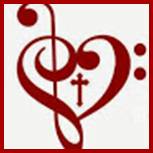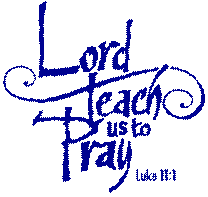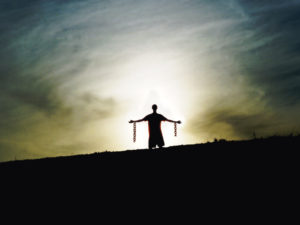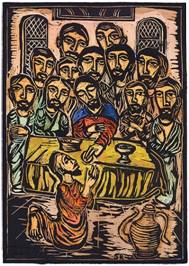
The New Year is here.
We’re facing a year of great struggles, in our nation and in the world, in our communities and even within our own families. Most of us are already weary, and it’s only Day One. Can we trust that God is speaking to us in the midst of this chaos, inviting us to be co-creators of a better future? And how can we hear God speaking in the midst of the chaos, so we can work for the future God has for us?
Luke’s Gospel tells us:
When the angels had left them and gone into heaven, the shepherds said to one another, “Let us go now to Bethlehem and see this thing that has taken place, which the Lord has made known to us.” So they went with haste and found Mary and Joseph, and the child lying in the manger. When they saw this, they made known what had been told them about this child; and all who heard it were amazed at what the shepherds told them. But Mary treasured all these words and pondered them in her heart. (Luke 2:15f)
Imagine being Mary and Joseph.
We all remember the story of this baby’s birth – a homeless family in Bethlehem, where so many desperate people still live today. We are told that they named their baby Jesus, and that they took him home to Galilee. But we are told nothing about the next few years of Jesus’ life. This is all Luke has to say about the years of Jesus’ growing up: “Mary treasured all these words and pondered them in her heart.”
Yet, unlike so many refugees over the centuries, we still remember Jesus’ name. We know he grew up to be called Jesus of Nazareth, and we know his teaching and healing brought hope to many despairing people. And we know he died, not by bombs falling on a Syrian city, not by drowning in the stormy Mediterranean, not of old age in an African refugee camp, but on a cross in Jerusalem. He died on a cross, crucified by people who feared the changes he was bringing into the world.
Throughout his life the poor, the homeless, the hungry gathered around him and learned from him. After he was killed, they saw him in his Risen Life, and they came to believe he had lived, died and risen again to bring God’s love into the world. And so they gave him another name – Jesus the Christ, Jesus the Anointed One; and they called themselves followers of the Way, because they knew he was still calling them to walk his Way of Love.
The Way of Love is hard.
Christians over the centuries have honored Jesus for his life, and death, and resurrection – but most of us didn’t listen deeply enough to his story. We forgot that Jesus came to show us the Way of God in this world, not merely to show us how to get to the next world. We forgot that Jesus did not come to do all the work of salvation for us. We forgot that he told his disciples he would continue to walk the Way, alongside them – and us.
The first followers of Jesus had to learn this hard lesson. They expected Jesus to come back very soon, in clouds of glory, to remake the world into the Kingdom of Heaven. But as their lives moved on, as their loved ones died, they began to wonder: When will he return? And they began to ask: How long will we have to wait?
But tradition says that Mary, to the end of her long life, treasured all God’s words, and pondered them in her heart.
How can we hear what God is teaching us?
Here’s the story of another Mary – Mary Poole.
In the fall of 2015, thousands of Syrian refugees began pouring out of Turkey into the Mediterranean Sea, hoping to find shelter and safety in Europe. One of those refugees was a little boy named Alan Kurdi, who was drowned when the waves swamped his family’s sinking boat. The next morning, news around the world was full of heart-breaking pictures of Alan’s body, lying on the sand.
Mary Poole, a longtime resident of Missoula, Montana, was one of the people who saw Alan’s photo. Mary found herself talking to her friends about the photo; she could not get it out of her mind. “I didn’t even know what a refugee was,” she remembers, “but the feeling that I needed to do something did not go away.”
Mary Poole did something – and it all began with listening to her heart.
Mary was a new mother, and she couldn’t stop thinking about this other small child, dead on the shore of a Mediterranean island. The picture, the pain, the compassion in her heart, wouldn’t go away. So she started calling around to American organizations that help to resettle refugees, and eventually she founded a new organization, Soft Landing Missoula, to help welcome immigrants to Montana.
Soft Landing quickly became controversial. One candidate for governor even sent out a mailer showing a man in a turban carrying a Kalashnikov rifle. The text promised that the candidate would “stand up to dangerous refugee programs.”
The candidate with the Kalashnikov lost narrowly last month, but it’s clear that many people in Montana and nationally resonated with his message. Right after Missoula’s City Council signed a letter of support for Soft Landing, a councilman started to receive letters, calls, and emails against the proposal to bring refugees to the area. “It’s just fear,” he said. “People are afraid of what they don’t understand.”
That councilman has concluded that people seem to have two opposite understandings of what it is to be an American. Some view all immigrants with suspicion, and are especially worried about Muslims. Others think of America as a place of abundant resources, with hospitable people who are willing to share what they have.
As for Mary Poole, everywhere she looks she finds resources and ready volunteers. “Yes, we’ve received death threats,” she said, “but for every one of those there are 30 volunteers.” Soft Landing has organized teams of five volunteers to coordinate help for each refugee family. It has over 400 people ready to serve on those teams, and more than 1,000 on the mailing list of people willing to help with supplies, donations, and other forms of support. Mary Poole envisions creating a community center where refugees and Missoulans can cook together, celebrate holidays together, and teach each other languages and traditions. (You can learn more of the story from The Christian Century for December 21, 2016.)
This is just one of the many stories the New Year has for us, stories that point us toward hope in the midst of chaos.
So here’s a spiritual practice for the New Year: holy listening.
What should we listen to?
Listen to the wise among us – the famous people who write great books and compelling songs, and ordinary wise people who are members of our own congregations….
Paula D’Arcy, one of those famous writers, says “God always comes to you disguised as your life.” So don’t look for angels descending from the sky – look at the life that comes at you every day.
How should we listen?
Look to Scripture and other holy writings for examples of how to listen. In today’s Gospel Luke tells us, “Mary pondered all these things in her heart.” In today’s story from The Christian Century, Mary Poole pondered that photo of Alan Kurdi in her heart.
Here’s what it looks like to ponder: imagine you are walking on a beach, with the tide coming in, wave after wave crashing on the shore. But in the midst of the ocean’s roar you are looking at the rocks on the beach, hunting for the rock that speaks your name. When you find your rock, you’ll pick it up and carry it with you. You’ll turn it over and over again in your hand, and then feel it again and again in your pocket, until it becomes deeply familiar to you, and until it speaks to you. That’s pondering.
Listen for your own melody.
Our last hymn today is the Christmas carol, “It came upon a midnight clear…”
Yet with the woes of sin and strife the world has suffered long;
beneath the heavenly hymn have rolled two thousand years of wrong;
and warring humankind hears not the tidings which they bring;
O hush the noise and cease your strife and hear the angels sing.
Your melody will be a harmony that comes from at least three strings.
There are the songs sung by the world – songs of cruelty and despair, songs of compassion and hope.
There are the songs sung by the voice of Jesus – songs of compassion, courage, hope, and faith.
And there are the songs that sing in our own hearts – the songs that resonate within our souls.
You can’t sing every single song; you’ll need to find the song that is yours to sing.
Singing your own song will require three faithful practices – holy listening, holy reading, and holy pondering.
Holy listening is a process. The process begins with what Joan Chittister calls obedient listening : “Holy listening helps us filter messages from the world through the voice of Jesus.”
Holy reading: lectio divina. If we prayerfully listen to Scripture, whether we’re gathered together in church or at home alone, lectio divina will teach us to know the voice of Jesus when we hear it.
Holy pondering. If we listen to the voice of Jesus; if we listen to the world around us; if we listen to our own hearts – then we will eventually hear our own song, planted there by the Holy Spirit of Jesus.
Our inner responses to the voice of Jesus – and to our own song that sings in harmony with Jesus’ voice – will point us in the right direction, and then give us the courage to go where Jesus leads us.
And then we can continue Jesus’ work in this New Year:
When the song of the angels is stilled,
When the star in the sky is gone,
When the kings and the princes are home,
When the shepherds are back with their flocks,
The work of Christmas begins:
To find the lost,
To heal the broken,
To feed the hungry,
To release the prisoner,
To rebuild the nations,
To bring peace among people,
To make music in the heart.
(Howard Thurman, The Work of Christmas)
A sermon preached at St. Benedict’s Church, Los Osos, on January 1, 2017.
A Soft Landing in Montana *
In the fall of 2015, newspapers, computers, and TV screens were showing the heartbreaking image of a drowned three-year-old Syrian refugee, Alan Kurdi, who lost his life trying to reach Turkey along with his family. One of those who saw the photo was Mary Poole, a longtime resident of Missoula, Montana. She and her friends found themselves discussing the photo. “I didn’t even know what a refugee was,” Poole recalled. “But the feeling that I needed to do something did not go away.”
Poole had recently become a new mother, and the photo of Kurdi haunted her. She started making phone calls to organizations that resettle refugees, learning far more than she ever knew there was to learn about the process of resettlement. One agency she called was the International Rescue Committee in Seattle, which ran an office in Missoula until 2008. The man who answered the phone was Bob Johnson, who had opened the IRC’s Missoula office in 1979. Just four days from retirement, Johnson agreed to help Poole reopen the office in Missoula.
Missoula is the only community that has ever requested the opening of an IRC office on its own. In conjunction, Poole founded the organization Soft Landing Missoula to help welcome immigrants.
The work of the IRC and Soft Landing Missoula quickly became controversial. A candidate for governor – who lost narrowly in November – sent out a mailer showing a man in a turban carrying a Kalashnikov rifle. The text promised that the candidate would “stand up to dangerous refugee programs” and refuse entry to “unvetted refugees.”
After the election, it is not clear what effect this kind of anti-refugee rhetoric will have, but it is clear that many people in Montana and nationally resonated with it. Right after Missoula’s City Council signed a letter of support for Soft Landing and the IRC, councilman Jon Wilkins started to receive letters, calls, and emails against the proposal to bring refugees to the area. “It’s just fear,” he said. “People are afraid of what they don’t understand.”
People seem to have two opposite understandings of what it is to be an American. Some view all immigrants with suspicion but are especially worried about Muslims. Others see America as a place of abundant resources and hospitable people who are willing to share what they have. .
Everywhere Mary Poole looks, she finds resources and ready volunteers. “Yes, we’ve received death threats,” she said, “but for every one of those there are 30 volunteers.” Soft Landing has organized teams of five volunteers to coordinate help for each refugee family. It has over 400 people ready to serve on those teams, and more than 1,000 on the mailing list of people willing to help with supplies, donations, and other forms of support. Mary Poole envisions creating a community center where refugees and Missoulans can cook together, celebrate holidays together, and teach each other languages and traditions.
Shaun Casey, special representative of the Office of Religion and Global Affairs at the U.S. State Department, sees Poole’s work being replicated nationwide. He said that even in a political environment that has turned negative, people at the grass roots have responded to refugee resettlement with an “amazing” level of innovation and collaboration.
Casey is struck by how much of the collaboration is interreligious. He recalled going into the office of a resettlement center in New Jersey. “This is going to sound like a bad joke,” Casey said, “but sitting at the table were an imam, a pastor, and a rabbi.” The three had met each other through the relief agency Church World Service. “Something is afoot at the grassroots level,” he said. Part of it is the desire to increase the amount of aid to refugees, “but there is also the ancillary benefit of a new form of interreligious interaction.” In the refugee resettlement communities that he visited last year, Casey said, reports of political vitriol would lead to an increased number of calls to refugee centers saying, “How can we help?”
* from Resettling Refugees in a Time of Fear: Welcome to Missoula
The Christian Century, December 21, 2016












